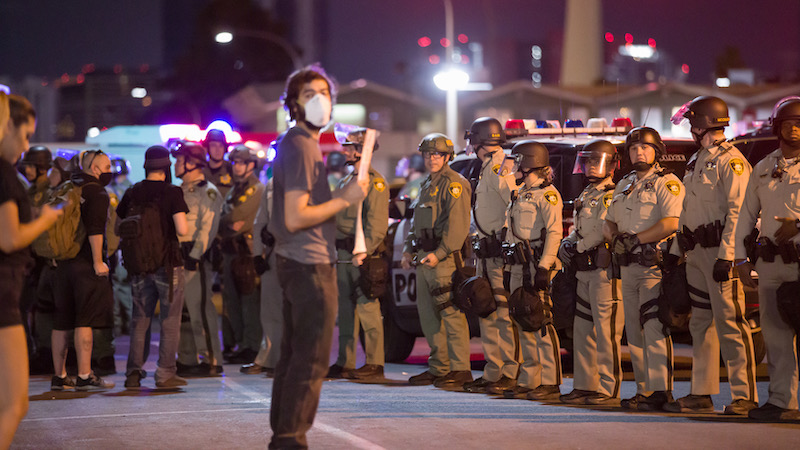Outside of a gymnasium, on the campus of a small Catholic high school in downtown Phoenix, there is an unassuming plaque that reads, Pro Deo, domo, et patria. This translates from Latin to “For God, home, and country.” On every tour I gave to prospective students, I would point out the small plaque and tell a cohort of sleepy young teenagers that this is what students were taught to love and to love well. Many of our deeds in both the private and public spheres are informed by our genuine love, or lack thereof, for God, home, and country.
I thought of this as I reflected on the shortcomings of the characters within Fyodor Dostoevsky’s Demons. Demons is a late 18th century novel written to serve as a political commentary inspired by a politically motivated murder in Russia. Dostoevsky sought to warn the Russian people of the personal and political dangers of popular western philosophies that were finding their way into the Russian psyche. The primary philosophy he warns against is nihilism, which in a footnote of the novel is said to be a political doctrine of the younger generation of the 1860s “who advocated the destruction of the existing social order without specifying what should replace it.” Nihilism is the conclusion reached by “rejecting everything that cannot be palpated,” resulting in a belief that life has no greater purpose other than pleasure or suffering (Dostoevsky, 720). Unsurprisingly, nihilists reject religious and moral ideas as unnecessary. In the novel, nihilistic philosophy possesses certain characters, wreaks havoc on the community, and results in murders, suicides, and a failed attempt at a political rebellion.
For Home
A child’s educational formation begins in the home long before they enter the classroom. A healthy idea of human relationship is learned through experience and observation. The love learned through the family can help build healthy communities. Demons exemplifies the absence of this love in two of its most troubled characters, Pyotr and Nikolai, who both lack father figures. The former is susceptible to the allure of power and will do anything to attain it, including manipulation and murder. The latter’s profile is more complex, and yet, has similar failures; Nikolai does not have any meaningful relationships and sins relentlessly against his community. He secretly marries a disabled woman as a deranged joke. He flirts with other men’s wives. He fathers a child with another man’s wife. The list goes on.
These two characters are a reflection of the rest of the town, which lacks authentic relationships across the board, albeit with exceptions. The few exceptions are very touching moments: the character of Kirillov playing with a child, Shatov witnessing childbirth, a woman Stepan has just met tending to him on his deathbed, and Vavara Petrovna’s grief. These moments are stark contrasts to the dominant themes of unrepentant murder in pursuit of power, broken relationships, and overall despair.
Paralleling a decline in the love of home is a decline in patriotism, which is observed through the novel’s themes of inter-generational and class conflict. The young characters grew to disrespect and even resent older generations, and in result, Russia as well. There seems to be a consensus among the younger generation that Russia needs to embrace more modern practices and philosophies. As a result, they assert that the older generation’s love for Russia blinds them to the need for progress. The youth’s complaint against patriotism fails to understand true patriotism. Properly understood, patriotism, as defined by GK Chesterton in Orthodoxy, desires progress for a country because it is loved, not because it is despised.
In the novel, disdain for patriotism comes primarily from the children of elites. Dostoevsky repeatedly implies that the elites criticize a country they are not familiar with. It is no coincidence that many of the young characters pushing for revolution have spent a significant amount of time abroad, demonstrating a fatal disconnect from their native Russia. They were never formed to love their country, because their educational formation was oriented away from Russia.
Ironically, no character exemplifies this negative spirit better than Stepan Vselevodich, a teacher and scholar who is a member of the older generation. He prefers to speak French over Russian, and until the end of his life, has never experienced the Russian countryside. While in the countryside, he romanticizes the peasant’s lifestyle and simultaneously treats them like servants. Shatov rebukes Stepan, telling him that the elite in Russia “never loved the people, never suffered for them or sacrificed anything for them.” Shatov draws the final link of lack of patriotism to atheistic nihilism when he tells Stepan that “those who have no people, have no God” (Dostoevsky, 38). Shatov’s criticism of the elites evinces a primary critique Dostoevsky makes throughout the book about how the young aristocrats and nihilists have withdrawn from the “true” Russia.
For God
Finally, love of God is a primary cornerstone to fruitful progress over destruction. Although often dismissed in the modern age as simply a cultural tie, love of God, or at least an openness to the idea of God, is invaluable to an individual and their broader community. Many of Dostoevsky’s most troubled characters have completely lost faith in God and religion. The many characters who commit suicide have expressed that they do not believe in God, or that God is dead. Staunch atheism indicates hopelessness and is the underbelly of the nihilistic philosophy that possesses the town.
While suicide is abundant in the novel, the character of Kirillov in Demons is particularly notable regarding suicide’s connection to atheism and nihilism. He seeks to be a sort of martyr for nihilism and believes that “there will be entire freedom when it makes no difference whether one lives or does not live” (Dostoevsky, 115). For Kirillov, any attachment to this life indicates a lack of true freedom. He believes that through killing himself he can disprove the existence of God and even ascend to a level of divinity. Thus, Kirillov seeks to commit a “noble” suicide. He says that all others who commit suicide do so for selfish or misguided reasons, whereas he would do so to demonstrate his complete independence from worldly attachments, and attain true freedom.
Ironically, when Kirillov does eventually commit suicide in the attempt to demonstrate his personal freedom and enlightenment, he allows himself to be used as a political pawn by those attempting to destroy the current regime. His attempt to prove his lack of care for the material world has a distinctly material impact. Kirillov’s character demonstrates that the adoption of a nihilistic philosophy leads to a disregard for your own life and the wellbeing of your community. His death reveals that no matter how idealistic our aims, we cannot escape the reality that our lives and actions have broader political and social impact. The act of destruction does nothing to promote genuine progress.
In a notable distinction from the characters who kill themselves, the characters who die noble deaths come to believe in God shortly before their end and reject the project of the nihilistic revolution. Shatov’s belief in God is confirmed when he sees his wife give birth; he is shortly thereafter murdered. Stepan seems to have a conversion during his time spent in the Russian countryside shortly before his demise. Almost simultaneously as they come to believe in God, these characters recognize the evil that came from the revolutionary (explicitly atheistic) society. Shatov’s dissent results in his tragic murder, and before his end Stepan likens the revolutionary ideas that possessed the town to the demons driven out of the demoniac in the Gospels: the people of the town, including himself, are the demon possessed swine that ran off the cliff.
Conclusion
Within Demons, Dostoevsky demonstrates how improper formation has dire consequences for the next generation. His characters experience an absence of appropriate love for God, home, and country, resulting in an individual who can be easily overtaken by insidious ideas and philosophies. This individual can become the type of revolutionary who seeks to destroy the current regime simply because they are unable to recognize the good that already exists. Appropriate progress recognizes and preserves the inherited good, while seeking necessary and measured improvement. Progress should not find its roots in destruction. One’s formation to recognize the good begins in the home and can be deeply enriched through formal education. To seek progress without properly formed citizens can cause change to be far more disastrous than good.
We can observe the importance of education and formation through the character of Stepan, who is the novel’s scholar and “teacher.” He is responsible for the education and formation of many of the key leaders in the revolution. His failure appears on all fronts: as a father, he abandons his son. As an instructor, he cannot instill in the young revolutionaries a proper recognition of what is good, partially due to his own detachment from Russia itself. And as a man of faith, he cannot seem to ever find settled meaning in his relationship with God, until it is much too late. In the end, Stepan’s personal failures reflect the failures of his generation. I would argue that these failures are also reflected in our own contemporary moment. If we fail to appropriately know and love our family, country, and God, and fail to instill these loves in future generations, we render ourselves incapable of healthy and appropriate progress, and instead make ourselves susceptible to the destruction of what is good.



